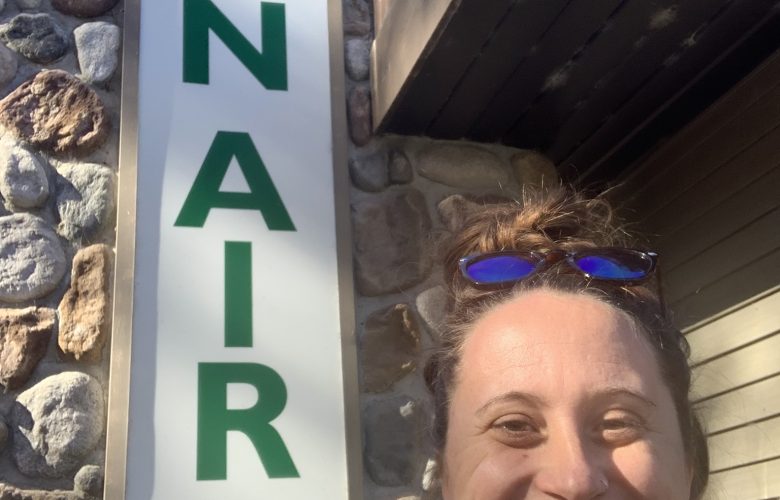Incarcerated parents read aloud from Benzie County jail
By Beau Vallance
Current Contributor
Over the past three months, 44 Benzie County children have heard their parents’ voices, reading aloud to them. This is remarkable, because these voices were coming from jail.
Among the many things that children of an incarcerated parent miss out on is the special bonding that comes from sharing a book, and all that that means for future learning. Children develop literacy skills—listening, focusing, following—before they can actually read, and children who are read to start school with a larger vocabulary, higher reading readiness, and increased likelihood of school success, generally.
But for some children in Benzie County, the joys—and associated benefits—of having a parent read aloud to them have been beyond reach, until this spring.
Since April 2017, the Remain In Touch program at the Benzie County jail has allowed children to hear an incarcerated parent reading aloud to them—and it has not cost taxpayers a penny.
So far, 25 inmates have been recorded while reading books for their children, some repeatedly—44 children have received one or more CD recordings and books; a total of 102 books and CDs have been mailed home.
“[RIT] gives an outreach to the inmates that they wouldn’t normally have,” says Lieutenant Daniel Smith, a Benzie County jail administrator who enthusiastically supports the program, noting that inmates “absolutely” look forward to each session.
Why It Is Needed
Nationally, 5.1 million children under the age of 17 have had, or currently have, at least one incarcerated parent. Michigan ranks among the top five states in the nation for the percentage of children who have had a parent in jail: a total of 228,000 minors, or 10 percent of Michigan children, were affected as of 2011, the latest statistics from the Annie E. Casey Foundation.
Knowing the statistics about early childhood development, Connie Eisenhart set out to address the gap between children and their incarcerated parents. Eisenhart taught in the Wayne-Westland Community schools before retiring to Leelanau County in 1995, and several of her students had incarcerated parents.
In 2016, Eisenhart founded Remain In Touch (RIT), a non-profit literacy program to help incarcerated parents in Leelanau County to stay connected with their children through reading aloud via recordings. Eisenhart was inspired by a similar program downstate, in Washtenaw County, called Staying In Closer Touch.
RIT expanded to Benzie County this past spring.
Through this program, inmates in both counties have the opportunity to select a free book for each of their children, 0-12 years of age, as long as there is no personal protection order that restricts contact. As the inmate reads the book aloud, the story is recorded digitally, and then the recording and the book are sent to the inmate’s children, allowing the parent to “remain in touch,” and thus bridging the gap that exists during the time of his/her incarceration, according to RIT’s website.
How It Works
The Benzie program currently runs on only three volunteers. Kay Leers, a retired teacher and Benzie resident, coordinates the program and represents Benzie County on the RIT board of directors. She also coordinates the three volunteers, in addition to managing the inventory and mailings.
Every other Tuesday, a volunteer goes to the county jail, where there is a cart with more than 200 new books that have been purchased through donations. The books are grouped by age-appropriateness, for ages 0 to 12 years old. The guard gives the volunteer a list of those parents who want to read. Inmates choose from the cart of books; one book for each child. The volunteer sets up in the jail’s library with a recorder, and inmates are called in one by one; volunteers and inmates exchange no personal information, besides names.
The volunteer and the inmate shake hands, introduce themselves, and sometimes the inmate will ask for guidance in selecting from among the books. Some are adept readers, others less so, but they become comfortable when reading “to their children,” in the volunteer’s presence. (Grandparent readers are also welcome, and the Benzie program recently had its first grandparent reading to two grandchildren.)
The inmate reads aloud, sometimes with a short introductory or concluding comment—maybe the book was a childhood favorite of the inmate’s, or “This is a scary book!” for a child who is into horror stories, for example. If it is a short children’s book, the inmate usually reads the whole thing; if it is a “chapter book” for a child who can read, perhaps the first chapters are read aloud by the inmate, so that the child can continue reading on his/her own.
Recording sessions run until each participating inmate has read one book for each child, typically about two hours. On the program’s very first day, 21 books were recorded.
The volunteer burns the recording onto a CD, then mails the CD and the matching book to each child; each child at home receives an individually mailed package, addressed to him/her. The book and the recording then belong to the child, who can listen again and again, continue reading the book on his/her own, and share the reading with a sibling or with friends.
One child, reports a volunteer, listens to the recording every night at bedtime.
Bringing It To Benzie
Bringing the program to Benzie County has been a community effort, with partners including Benzie Cares for Kids, Benzie Early Childhood Workgroup (0-6) from the Human Services Collaborative, and Brilliant Books in Traverse City.
Eisenhart credits Sarah May, coordinator of the Benzie County Human Services Collaborative, with organizing the Benzie County branch of RIT after Headstart coordinator Jennifer Kelly read about the Leelanau program in an October 2016 article in the Leelanau Enterprise. Kelly invited Eisenhart to speak in Benzie County the following month.
“Sarah [May] really ran with it,” Eisenhart says, and less than five months later, the Benzie program was up and running.
The stories of the recording sessions show the value of the program.
One man had the idea of reading a page aloud, then timing a silence that would be long enough for his wife, at home with the child, to read the next page—in effect taking turns, as they would if he were at home.
Another, reading a book that he had not previously known, was astounded at the surprise ending.
“Whoa! I never saw that coming!” he said and laughed on the recording.
Another inmate had a baby who was born during his incarceration, and when the facilitator suggested reading to the baby, the inmate said, “Do you read to babies?” He was encouraged to introduce the newcomer to the sound of his voice through the program.
One inmate, pressed for time, opted to read the back-cover summary of each book, one for each child.
Two inmates hope to donate to support the RIT program when they are out. One decided not to record after all, hoping to go home that day and not need it. Another predicted a long series of sessions, building quite a library for the child at home.
The Books
Staying In Closer Touch—the similar program in Washtenaw County—previously developed a master list of titles. RIT uses that list but also adds to it.
Some well-known titles, among the 140 now on the list, include: Goodnight Moon, On the Night You Were Born, The Very Hungry Caterpillar, All the Colors of the Earth, Sarah Plain and Tall, Where the Wild Things Are, Grace for President, and Paint the Wind.
The program avoids religious books—they would have to cover all religions otherwise. Holiday-themed books with a limited “shelf life” are also avoided.
For security reasons, all books are brand new. Donations and small grants cover the cost of the books, purchased from Brilliant Books in Traverse City at a 20 percent discount and picked up by Eisenhart, who delivers to both the Leelanau and Benzie programs. Brilliant Books donates the bookmailer packing.
The Results
No one involved in Remain In Touch can find a single downside to the program. It was approved quickly when proposed to the Benzie County Sheriff’s Office and jail staff.
“[RIT has been] nothing but positive for the inmates,” says Smith, the jail administrator. “There’s been no negative feedback—they really like it and absolutely look forward to it. They love doing it. It’s a great program!”
The inmates are nothing but grateful, and offenders who stay in touch with family are less likely to re-offend—studies have shown that prisoners who maintain strong family and friendship ties during imprisonment, and those who assume marital and parental roles upon release, have lower rates of returning to poor behaviors than those who function without family ties, expectations, and obligations.
“The inmates love the opportunity to connect with their children,” Kay Leers says. “Some have cried in gratitude, saying, ‘This is so wonderful, what you’re doing.’”
The volunteers love the work. Leers, a retired teacher, has been involved in many literacy programs, but “this is different”; as a board member and coordinator, she says “I just feel uplifted, I guess.”
The best part, though, is that the children hear their parents reading to them at home, from real books.
For more information on the program, visit RemainInTouch.org online. To donate to the program, visit that website or visit Brilliant-Books.net/RemainInTouch to see a list of books that can be bought online and held for the coordinator to pick up in Traverse City.
Featured Photo Caption: A new reading program at Benzie County jail. Photo by Beau Vallance.




